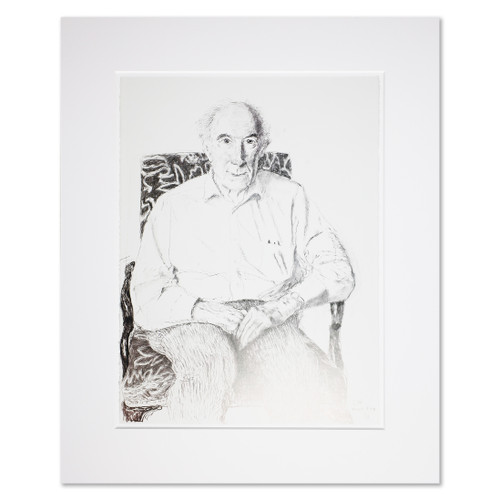Original print from David Hockney's "A Bigger Book."
Measures 45.75" x 34.5" overall.
Excellent condition!
*The glare shown at the top right of the image is not inherent to the original nature of the print.
About this piece:
This reproduction print was carefully removed from TASCHEN’s 2016 SUMO edition of David Hockney's "A Bigger Book." The book is a limited production publication of 9,000 editions. The print is artfully mounted with an archival 8-ply top mat, ready for framing.
The original piece by David Hockney (painted in 1970-1971) is an acrylic on canvas. This is one of a series of double portraits Hockney started in 1968.
Mr. and Mrs. Clark are the dress designer Ossie Clark and the fabric designer Celia Birtwell. The two came from north England and first met Hockney in 1961 while Clark was studying at Manchester College of Art. Both Clark and Hockney went on to study at the Royal College of Art in London. In 1969, Clark and Birtwell were married and Hockney was their best man. This portrait of the couple was painted at their flat in Notting Hill Gate in west London. Hockney began this piece in 1969 by taking photographs and making drawings. He began working on the canvas in spring of 1970 and completed the painting in early 1971. On the left side of the painting, there is an etching from his earlier series “A Rake’s Progress.”
The piece plays on a reversed interpretation of the “Arnolfini Portrait” from Jan van Eyck in 1434. Birtwell is pictured with a vase of white lilies, which is traditionally a symbol of annunciation and feminine purity. In a contrasting view to the Arnolfini Portrait where the dog at the couple’s feet represents fidelity, the cat on Clark’s lap is symbolic of somebody who does as they please and disregards rules. Hockney has pointed out that this painting reversed one of the conventions of wedding portraiture by having Birtwell stand while Clark sits. The space between the couple represented by the open window and the onlooking of the third party (the artist or viewer) turned out to be prophetic; the couple were divorced in 1974. Hockney stated the purpose of this painting was to fully emulate the relationship between two people. In 1976 after the painting was long finished, Hockney described it as one of only two works of his to come close to naturalism.









